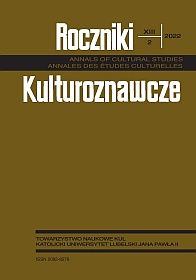The Mimetic Theory from the Perspective of Fundamental Theology
Abstract
The practitioners of fundamental theology have essentially two goals to achieve – defending Christianity (apology) and entering into dialogue with those on the margins or outside of Christianity who have open hearts and minds. In the implementation of the above tasks, the mimetic theory developed by the French-American literary scholar and anthropologist René Girard (1923–2015) is useful. Girard, starting from man as an imitator, points to a negative mimesis that leads to competition and conflict. In extreme cases, where there is no institutional preventive mechanism, the mimetic crisis could result in complete social destruction. Girard points out that the way out of the threat is to imitate individual aggression, which leads to collective violence that unites the participants in it. The experience of transition from chaos to peace is later repeated as part of the sacrificial ritual. It is important not to know what the scapegoat mechanism, which is the basis of the religious and political order, actually consists of. Girard optimistically points out that thanks to the discovery of the truth about the scapegoat mechanism, it is losing power. It happened fully in the biblical space, mainly thanks to Jesus Christ. The problem is that people did not want and still do not want the truth about the scapegoat mechanism. It is attractive to them because it efficiently transforms hostility into friendship, and the costs are small – there will always be someone to sacrifice. The above situation is not typical of ‘barbarian cultures’. Also in today’s Western world, as the Viennese journalist Kirstin Breitenfellner points out, especially in the media space, the victim is something socially useful, and hence desirable.
References
Adamczyk, Robert i Tomasz Królak. „Włocławek”. Wiadomości KAI 20 (2014): 17.
Benedykt XVI. Poznanie prawdy. Wykłady papieskie. Kraków: Wydawnictwo WAM, 2017.
Breitenfellner, Kirstin. „Das Opfer in den Medien oder Wie können wir in den Medien über Opfer reden?” (tekst przysłany drogą elektroniczną przez Kirstin Breitenfellner 24 września 2019).
Breitenfellner, Kirtstin. Wir Opfer. Warum der Sündenbock unsere Kultur bestimmt. München: Diederichs, 2013.
Budzik, Stanisław. „Księża na Księżyc? Wprowadzenie”. W: RYSopis kapłana. Wizerunek księdza w kulturze polskiej w XXI wieku, red. Łukasz Janicki, 5–11. Lublin: Gaudium, 2018.
De Maistre, Joseph. O Papieżu. Tłum. Julian Miłkowski. Warszawa–Ząbki: Apostolicum Wydawnictwo Księży Pallottynów, 2008.
For René Girard. Essays in Friendship and in Truth, red. Sandor Goodhart i in. East Lansing: Michigan State University Press, 2009.
Franciszek. Chciałbym Kościoła ubogiego dla ubogich. Warszawa: Katolicka Agencja Informacyjna – Kraków: Wydawnictwo M, 2013.
Franciszek. Siła powołania. O życiu konsekrowanym i poprawie relacji w Kościele. Tłum. Agnieszka Fijałkowska-Żydok. Poznań: Wydawnictwo Święty Wojciech, 2018.
„Franciszek: dwór jest trądem papiestwa”. Wiadomości KAI 41 (2013): 30.
Girard, René. „Rzeczy ukryte od założenia świata”. Literatura na Świecie nr 12(1983): 74–182.
Girard, René. Apokalipsa tu i teraz. Rozmawiał Benoît Chantre. Tłum. Cezary Zalewski. Kraków: Wydawnictwo WAM, 2018.
Girard, René. Dawna droga, którą kroczyli ludzie niegodziwi. Tłum. Mirosława Goszczyńska. Warszawa: Spacja, 1992.
Girard, René. Ich sah den Satan vom Himmel fallen wie einen Blitz. Eine kritische Apologie des Christentums. Tłum. Elisabeth Mainberger-Ruh. München: Carl Hanser Verlag, 2002.
Girard, René. Kozioł ofiarny. Tłum. Mirosława Goszczyńska. Łódź: Wydawnictwo Łódzkie, 1987.
Girard, René. Oedipus Unbound. Selected Writings on Rivalry and Desire. Stanford: Stanford University Press, 2004.
Girard, René. Prawda powieściowa i kłamstwo romantyczne. Tłum. Karolina Kot. Warszawa: Wydawnictwo KR, 2001.
Girard, René. Sacrum i przemoc. Tłum. Maria i Jacek Plecińscy. Poznań: Brama – Książnica Włóczęgów i Uczonych, 1993.
Girard, René. Widziałem szatana spadającego z nieba jak błyskawica. Tłum. Ewa Burska. Warszawa: Instytut Wydawniczy PAX, 2002.
Golsan, Richard Joseph. „For René Girard: In Appreciation”. W: For René Girard. Essays in Friendship and in Truth, red. Sandor Goodhart i in., 199–209. East Lansing: Michigan State University Press, 2009.
Goodhart, Sandor. „Literature, Myth, and Prophecy: Encountering René Girard”. W: For René Girard. Essays in Friendship and in Truth, red. Sandor Goodhart i in., 87–99. East Lansing: Michigan State University Press, 2009.
Grzybowska, Elżbieta. „Płock”. Wiadomości KAI 44 (2018): 16.
Hobbes, Thomas. Lewiatan czyli materia, forma i władza państwa kościelnego i świeckiego. Tłum. Czesław Znamierowski. Warszawa: Fundacja Aletheia, 2005.
„Imagining the Other. Theo-Political Challenges in an Age of Migration”. Dostęp 24.09.2019. https://www.uibk.ac.at/congress/imagining-the-other/#top.
„Kard. Krajewski o pedofilii: życzyłbym wszystkim, aby tak zajęli się tym problemem, jak Kościół”. Wiadomości KAI 35 (2018): 22.
„Kirstin Breitenfellner”. Dostęp 22.01.2022, https://www.falter.at/zeitung/autoren/kirstin-breitenfellner.
„Kirstin Breitenfellner”. Dostęp 22.01.2022. https://www.kirstinbreitenfellner.at/.
Korusiewicz, Maria. Geometrie kultury według René Girarda. Katowice: Wydawnictwo Naukowe „Śląsk”, 2015.
Libera, Piotr. „«Do moich braci Kapłanów». List Biskupa Płockiego”. Okólnik Kurii Diecezjalnej Płockiej 8(2019): 45–50.
„List papieża Franciszka do ludu Bożego”. Wiadomości KAI 35 (2018): 20–21.
„Nowa ewangelizacja wymaga nowego języka, nowych form i nowego zapału. Rozmowa z biskupem elbląskim Jackiem Jezierskim”. Wiadomości KAI 31–32 (2014): 13–16.
„Piętnaście chorób kurii”. Wiadomości KAI 1 (2015): 18–19.
Pos, Sonja. „The Way to More Insight and Personal Freedom”. W: For René Girard. Essays in Friendship and in Truth, red. Sandor Goodhart i in., 139–145. East Lansing: Michigan State University Press, 2009.
Reineke, Martha. „Sacrifice and Sexual Difference: Insights and Challenges in the Work of René Girard”. W: For René Girard. Essays in Friendship and in Truth, red. Sandor Goodhart i in., 247–258. East Lansing: Michigan State University Press, 2009.
Romejko, Adam. „Dramat zbawienia – Raymunda Schwagera teologiczna recepcja i transformacja teorii mimetycznej”. Studia Gdańskie 21(2007): 173–193.
Romejko, Adam. „‘Lecz ja wiem: Wybawca mój żyje’ (Hi 19,25). Idea ofiary w myśli René Girarda”. Studia Gdańskie 21 (2007): 59–77.
„«Serce bez granic» dla dr Heleny Pyz – misjonarki z Indii”. Wiadomości KAI 22 (2015): 4.
Wesołowski, Waldemar. „Legnica”. Wiadomości KAI 19 (2015): 18.





